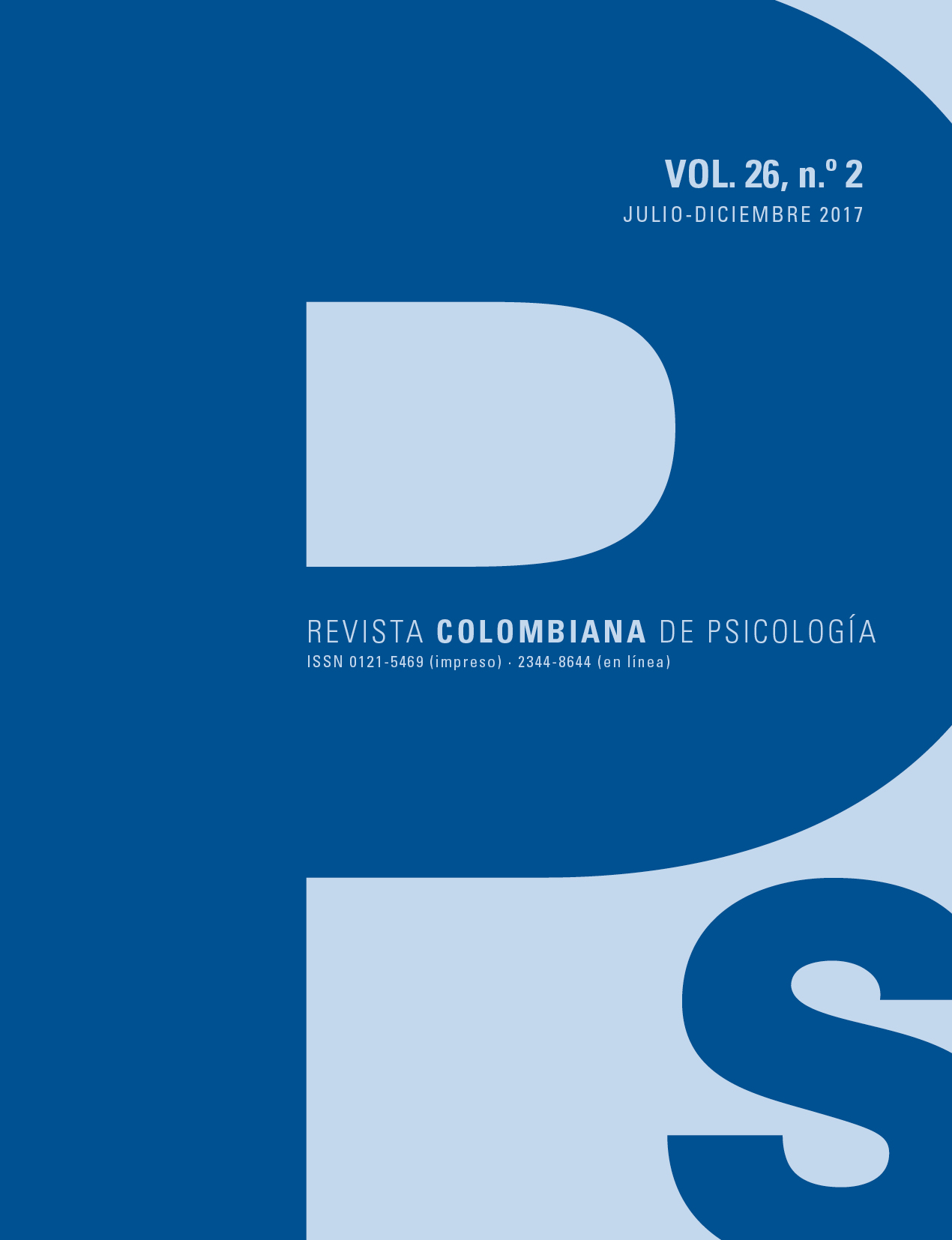¿Dónde Estamos? La Cultura Laboral Chilena desde Hofstede
Where Are We? Chilean Labor Culture since Hofstede
DOI:
https://doi.org/10.15446/rcp.v26n2.60557Keywords:
valores, cultura laboral, cambio cultural (es)Downloads
36 años después de la primera publicación del estudio de culturas nacionales desarrollado por Hofstede, se emprende un nuevo ejercicio para evaluar la configuración de valores de Chile. Este trabajo se enfocó en el diagnóstico de la capacidad de replicar los resultados obtenidos en estudios anteriores, a través de una muestra representativa de la población económicamente activa, y buscó integrar otros estudios sobre la llamada cultura organizacional chilena. En este sentido, se llevan a cabo consideraciones respecto a la calidad de los datos y los vacíos metodológicos que presentan las mediciones anteriores y se propone cuál sería la actual configuración de la cultura laboral chilena.
Cómo citar este artículo: Didier, N. & Luna, J. F. (2017). ¿Dónde estamos? La cultura laboral chilena desde Hofstede. Revista Colombiana de Psicología, 26(2), 295-311. doi: 10.15446/rcp.v26n2.60557
36 years after Hofstede’s first study of national cultures, we did a new exercise to evaluate Chile’s value configuration. This work focused on the ability to replicate the results obtained in prior studies using a representative sample of the economically active population, integrating other studies on the Chilean organizational structure. The study considers the data quality and the methodological gaps of the prior measurements and proposes the Chilean work culture’s cur- rent configuration.
How to cite: Didier, N. & Luna, J. F. (2017). Where Are We? Chilean Labor Culture since Hofstede. Revista Colombiana de Psicología, 26(2), 295-311. doi: 10.15446/rcp.v26n2.60557
References
Abarca, N., Majluf, N., & Rodríguez, D. (1998). Identifying management in Chile. International Studies of Management & Organization, 28(2), 18-37. doi:10.1080/00208825.1998.11656732
Arciniega, L. & González, L. (2000). Desarrollo y validación de la escala de valores hacia el trabajo evat 30. Revista de Psicología Social, 15(3), 281-296. doi:10.1174/021347400760259712
Arciniega, L. M., González, L., Soares, V, Ciulli, S., & Giannini, M. (2009). Cross-cultural validation of the Work Values Scale evat: Using multi-group confirmatory factor analysis and confirmatory multidimensional scaling. The Spanish Journal of Psychology, 12(2), 767-772. doi: 10.1017/S1138741600002134
Au, K. Y. (1999). Intra-cultural variation: Evidence and implications for international business. Journal of International Business Studies, 30(4), 799–812. doi: 10.1057/palgrave.jibs.8490840
Beugelsdijk, S., Maseland, R., & Van Hoorn, A. (2015). Are Scores on Hofstede’s Dimensions of National Culture Stable over Time? A cohort analysis. Global Strategy Journal, 5(3), 223–240. doi:10.1002/gsj.1098
Bird, A. & Metcalf, L. (2004). Integrating twelve dimensions of negotiating behavior and Hofstede’s work-related values: A six-country comparison. En
H. Vinken, J. Soeters, & P. Ester, Comparing cultures: Dimensions of culture in a comparative perspective (pp. 251-269). Boston: Brill.
Daly, P. S., Owyar-Hosseiniand, M., & Alloughan, M. E. (2014). Antecedents of citizenship behavior in Arab employees in Kuwait. International Journal of Cross Cultural Management, 14(2), 239-260. doi: 10.1177/1470595814522772
Dávila, A. & Elvira, M. (2005). Cultura y administración de recursos humanos en América Latina. Universia Business Review, 5, 28-45.
Dorfman, P. & Howell, J. (1988). Dimensions of national culture and effective leadership patterns: Hofstede revisited. Advances in International Comparative Management, 3, 127-150.
Fang, T. (2003). A critique of Hofstede’s fifth national culture dimension. International Journal of Cross Cultural Management, 3(3), 347-368. doi: 10.1177/1470595803003003006
Fernandez, D., Carlson, D., Stepina, L., & Nicholson, J. (1997). Hofstede’s country classification 25 years later. The Journal of Social Psychology, 137, 43-54. doi: 10.1080/00224549709595412
Gelfand, M. J., Erez, M., & Aycan, Z. (2007). Crosscultural organizational behavior. Annual Review of Psychology, 58, 479-514. doi: 10.1146/annurev.psych.58.110405.085559
Gómez, C. & Rodríguez, J. (2006). Four keys to Chilean culture: Authoritarianism, legalism, latalism and compadrazgo. Asian Journal of Latin American Studies, 3, 43-65.
Hofstede, G. (1980). Culture’s consequences international differences in work-related values. London: Sage.
Hofstede, G. (1983). Cultural constraints in management theories. Academy of Management Executive, 7(1), 81-94.
Hofstede, G. (1991). Cultures and organizations: Software of the mind. London: McGraw-Hill.
Hofstede, G. (2001). Culture’s consequences: Comparing values, behaviors, institutions and organizations across nations. New York: Sage Publications.
Hofstede, G. (2002). Dimensions do not exist: A reply to Brendan McSweeney. Human Relations, 55(11), 1355-1361. doi: 10.1177/00187267025511004
Hofstede, G. & Minkov, M. (2010). Long- versus short-term orientation: New perspectives. Asian Pacific Business Review, 16(4), 493-504. doi: 10.1080/13602381003637609
Instituto Nacional de Estadísticas. (1991). Compendio estadístico 1990. Santiago: ine. Kirkman, B. L., Lowe, K. B., & Gibson, C. B. (2006). A quarter century of “Culture’s Consequences”: A review of empirical research incorporating Hofstede’s cultural values framework. Journal of International Business Studies, 37, 285-320. doi: 10.1057/palgrave.jibs.8400202
Kogut, B. & Singh, H. (1988). The effect of national culture on the choice of entry mode. Journal of International Business Studies, 19(3), 411-432. doi: 10.1057/palgrave.jibs.8490394
Lips-Wiersma, M. & Wright, S. (2012). Measuring the meaning of meaningful work: Development and Validation of the Comprehensive Meaningful Work Scale (CMWS). Group & Organization Management, 37(5), 655-685. doi: 10.1177/1059601112461578
Luna, J. F. & Barahona, A. (2010). Gestión estratégica de personas en Chile: estudio exploratorio sobre prácticas de recursos humanos. Seminario para optar al grado de Magister en Dirección Estratégica de Recursos Humanos y Comportamiento Organizacional, Pontificia Universidad Católica de Chile, Escuela de Administración, Santiago.
Luthar, H. & Luthar, V. (2007). A theoretical framework explaining cross-cultural sexual harassment: Integrating Hofstede and Schwartz. Journal of Labor Research, 28(1), 169-188. Markus, H. R. & Kitayama, S. (1991). Culture and the self: Implications for cognition, emotion, and motivation.
Psychological Review, 98, 224-253. doi: 10.1037/0033-295X.98.2.224.
McSweeney, B. (2002). Hofstede’s Model of national cultural differences and their consequences: A triumph of faith a failure of analysis. Human Relations, 55(1), 89-118. doi: 10.1177/0018726702551004
Minkov, M. (2007). What makes us different and similar: A new interpretation of the world values. Sofia: Klasika i Stil. OECD. (2015). oecd Employment outlook 2015. París: oecd Publishing.
Pérez, G. (2008). Gestión de recursos humanos en el contexto social y cultural chileno. Asian Journal of Latin American Studies, 21(1), 65-95.
PNUD. (1998). Informe de desarrollo humano en Chile. Las paradojas de la modernización. Santiago: PNUD.
PNUD. (2000). Informe de desarrollo humano en Chile. Más sociedad para gobernar el futuro. Santiago: PNUD.
PNUD. (2002). Informe de desarrollo humano en Chile. Nosotros los chilenos: Un desafío cultural. Santiago: PNUD.
PNUD. (2004). Informe de desarrollo humano en Chile. El poder: ¿para qué y para quién? Santiago: PNUD.
PNUD. (2017). Chile en 20 años: un recorrido a través de los Informes de desarrollo humano. Santiago: PNUD.
Rhee, J., Dedahanov, A., & Lee, D. (2014). Relationships among power distance, collectivism, punishment, and acquiescent, defensive, or prosocial silence. Social Behavior and Personality, 42(5), 705-720. doi: 10.2224/sbp.2014.42.5.705
Rodríguez, D. (1991). Gestión organizacional: elementos para su estudio. Santiago: Ediciones Universidad Católica de Chile.
Rodríguez, D., Bozzo, C., & Arnold, M. (1989). Cultura organizacional e innovación: el caso de Goodyear-Chile. En A. Dávila, & N. Martínez (Eds.), Cultura en organizaciones latinas (pp. 71-115). México: Siglo XXI. Rodríguez, D., Ríos, R., De Solminihac, E., & Rosene, F. (2005). Human resource management in Chile. In M. Elvira, & A. Dávila, Managing Human Resources in Latin America: An agenda for international leaders (pp. 149-164). Londres: Routledge.
Rodríguez, J. K. (2010). Employment relations in Chile: Evidence of HRM practices. Relations Industrielles/Industrial Relations, 65(3), 424-446. doi: 10.7202/044890ar
Rodríguez, J. & Gómez, C. (2009). hrm in Chile: The impact of organizational culture. Employee Relations, 31(3), 276-294. doi: 10.1108/01425450910946479
Shenkar, O. (2001). Cultural distance revisited: Towards a more rigorous conceptualization and measurement of cultural differences. Journal of International Business Studies, 32(3), 519-536. doi: 10.1057/palgrave.jibs.8490982
Sivakumar, K. & Nakata, C. (2001). The stampede toward Hofstede’s framework: Avoiding the sample design pit in cross-cultural research. Journal of International Business Studies, 32(3), 555-574. doi: 10.1057/palgrave.jibs.8490984
Søndergaard, M. (1994). Research note: Hofstede’s consequences: A study of reviews, citations and replications. Organization studies, 15(3), 447-456. doi:10.1177/017084069401500307
Taras, V., Kirkman, B. L., & Steel, P. (2010). Examining the impact of culture’s consequences: A three-decade, multilevel, meta-analytic review of Hofstede’s cultural value dimensions. Journal of Applied Psychology, 95(3), 405-439.
Tsui, A. S., Nifadkar, S. S., & Ou, A. Y. (2007). Cross-national, cross-cultural organizational behavior research: Advances, gaps, and recommendations. Journal of Management, 33, 426-478. doi: 10.1177/0149206307300818
Williamson, D. (2002). Forward from a critique of Hofstede’s model of national culture. Human Relations, 55(11), 1373-1395. doi: 10.1177/00187267025511006
Wu, M. Y. (2006). Hofstede’s cultural dimensions 30 years later: A study of Taiwan and the United States. Intercultural Communication Studies, 15, 33-42.
How to Cite
APA
ACM
ACS
ABNT
Chicago
Harvard
IEEE
MLA
Turabian
Vancouver
Download Citation
CrossRef Cited-by
1. Mónica Guzmán‐González, Fabiola Gómez, Marie‐France Lafontaine, Karla Tay‐Karapas. (2025). Profiles of Psychological Adjustment to Divorce and Separation: Associations With Attachment Insecurity, Forgiveness of the Former Partner, and Emotion Regulation Difficulties. Journal of Marital and Family Therapy, 51(3) https://doi.org/10.1111/jmft.70055.
2. Nicolás Osvaldo Didier Pino, Juan Francisco Luna. (2021). Escalas de Cultura de Dorfman y Howell. Análisis de Invarianza Factorial Progresiva. Revista Iberoamericana de Psicología, 13(3), p.146. https://doi.org/10.33881/2027-1786.rip.13309.
3. Jesus Juyumaya. (2022). How psychological empowerment impacts task performance: The mediation role of work engagement and moderating role of age. Frontiers in Psychology, 13 https://doi.org/10.3389/fpsyg.2022.889936.
Dimensions
PlumX
Article abstract page views
Downloads
License
Copyright (c) 2017 Revista Colombiana de PsicologíaThe RCP is published under the Creative Commons license and can be copied and reproduced according to the conditions of this license (http://creativecommons.org/licenses/by-nc-nd/2.5). RCP articles are available online at https://revistas.unal.edu.co/index.php/psicologia/issue/archive. If you would like to subscribe to the RCP as reader, please go to https://revistas.unal.edu.co/index.php/psicologia/information/readers and follow the instructions mentioned in the webpage. Additionally, a limited number of print journals are available upon request. To request print copies, please email revpsico_fchbog@unal.edu.co.


























